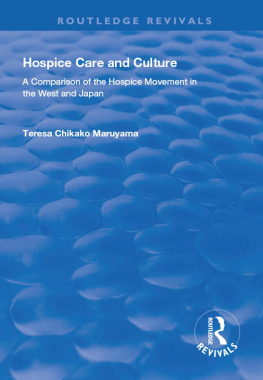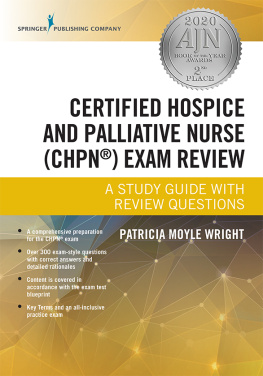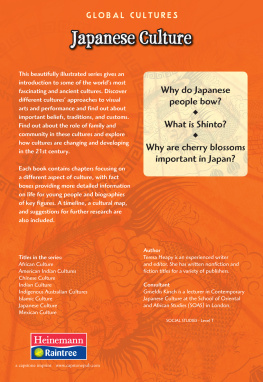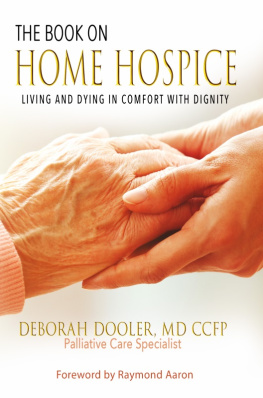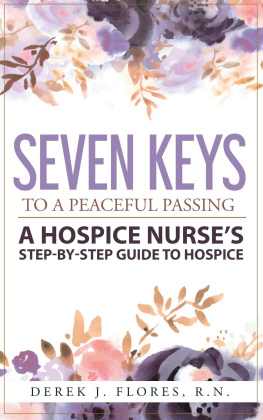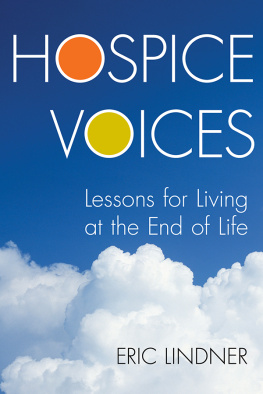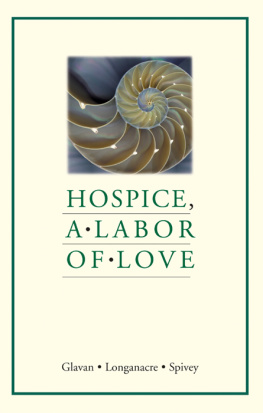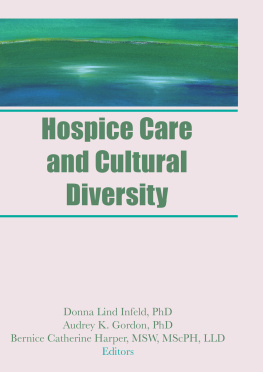HOSPICE CARE AND CULTURE
Hospice Care and Culture
A comparison of the Hospice Movement in the West and Japan
TERESA CHIKAKO MARUYAMA
First published 1999 by Ashgate Publishing
Reissued 2018 by Routledge
2 Park Square, Milton Park, Abingdon, Oxon OX14 4RN
711 Third Avenue, New York, NY 10017, USA
Routledge is an imprint of the Taylor & Francis Group, an informa business
Copyright Teresa Chikako Maruyama 1999
All rights reserved. No part of this book may be reprinted or reproduced or utilised in any form or by any electronic, mechanical, or other means, now known or hereafter invented, including photocopying and recording, or in any information storage or retrieval system, without permission in writing from the publishers.
Notice:
Product or corporate names may be trademarks or registered trademarks, and are used only for identification and explanation without intent to infringe.
Publishers Note
The publisher has gone to great lengths to ensure the quality of this reprint but points out that some imperfections in the original copies may be apparent.
Disclaimer
The publisher has made every effort to trace copyright holders and welcomes correspondence from those they have been unable to contact.
A Library of Congress record exists under LC control number: 98074201
ISBN 13: 978-1-138-31748-2 (hbk)
ISBN 13: 978-0-429-45389-2 (ebk)
Contents
The study from which this book arises was carried out over four years while I was at the Centre for Philosophy and Health Care at the University of Wales, Swansea. Portions of it have previously been published as The Japanese Pilgrimage: Not Begun in the International Journal of Palliative Nursing (Vol.3, No.2, March-April 1997, pp.8791), and I would like to thank the publisher for permission to use them here. This study would not have been possible without help from countless people and it is a pity that I cannot mention all of their names. But 1 would like to record my special thanks to all the members of the staff and secretaries of the Centre, particularly my supervisor Dr David A. Greaves, who has always given me useful advice and been patiently supportive of my academic life, and Ms Louise de Raeve, who has made useful comments and pointed out good literature sources. My genuine thanks are also due to Fr Francis Mackenna and Mr Neil J. Pickering, who are my best friends in Britain and have given me a lot of psychological as well as spiritual support in my most difficult and lonely times. I must give my heartfelt thanks as well to the many cancer patients and those in bereavement who I met in hospices, hospitals and various other places here in Britain as well as in Japan over the past years, many of whom encouraged me to carry on this work, though sadly some of them have already died before its completion. I am also very grateful to Yvonne Saunders, a cleaning lady for our building, who has always considered my convenience so that I can use the coffee room until very late at night whenever I have to stay up late in the department.
Being resident in Britain for more than four years, I have made friends with many British people and others from all over the world from more than 20 countries who are studying at the university. This vivid experience of cross-cultural communication with various races has enabled me to make cultural comparisons not only in my academic work but also in my ordinary day-to-day life. Although this research has been a philosophical enquiry about the hospice movement comparing the West and Japan, this rich cultural experience has inspired me in writing this book. So I gratefully acknowledge these friends from throughout the world beginning with Britain. Finally, let me send my thanks to my family who have been understanding towards my study and always very supportive from afar.
An expression like the West, which is used in the title and will be used throughout this book, can easily be attacked for its over generalization and simplification. There are many different cultures inside the Western world. It may also seem wrong to use the term the Western hospice movement, since there are some Western countries which have not yet established any institution named a hospice. We would like to say, however, that it may be acceptable to use this phrase the Western hospice in this study. Many Western countries have shared some general historical changes which have influenced the Western medical culture, for example, the doctors status, medical science, and also the Western perspective on life and death in relation to Christianity, the rise of individualism and the Enlightenment. The important thing is to look at how this common background, tendency, and change amongst different Western countries will relate to the care of the dying, particularly terminal cancer patients in Japan, when Japan imports the Western hospice movement. On the other hand, we should not bring the term the East as an object for comparison with the West, because our primary interest is to consider what will be the issues in applying the Western hospice movement especially to Japanese medicine. This requires us to explore the details of the Japanese situation in regard to the care of cancer patients, attitudes to death and dying, and the doctor-patient relationship, and to distinguish them from those of other Eastern countries.
Another important question we have to raise at the very beginning of the book is whether one can make a cultural comparison or can understand both the Western and the Japanese culture in an objective way. We are not sure if it is possible for the writer of this book, I myself, to understand both the Western and the Japanese cultures. To some extent, I have been deeply influenced by Western culture; have an English name, TERESA; have been given a Catholic education since my childhood (though in Japan), and have lived in Great Britain for more than four years while studying at the University of Wales, Swansea. The way I think, look at things, and behave, whether consciously or unconsciously, may appear westernized in other Japanese peoples eyes.
On the other hand it may be also true that I have not been able completely to discard all my Japanese ways of thinking or behaving in only four years, because I have been brought up in a Japanese family and culture for the past twenty odd years. I may be acting, without awareness, in a very typical Japanese way in Western peoples eyes, and will be treated as a Japanese or an Easterner by them no matter how many more years I live in this country. Thus I may be neither purely Japanese nor Western (British for example) and that means I have written this book, to some extent, as a half outsider of both the Japanese as well as the Western culture. So I may be able truly to appreciate neither of the two cultures.
There is always the temptation of extreme cultural relativism in making a comparison between two cultures, by drawing too clear a line between them. But the experience of a person like myself could be a kind of evidence that the West and Japan share some basic moral values and that they cannot be totally separable, otherwise, I would not have been able to live in the West for four years, and make any sense of the experience. If there was no continuity between the two cultures at all, I would have needed brainwashing in order completely to destroy my moral values as a Japanese person and change them into absolutely new ones so that I could adjust to life in the West. It is unrealistic to imagine that such brainwashing, which could create a completely new identity, can be done within four years. There is therefore no such a thing as perfect cultural relativism which determines that different cultures are unable to share moral values at all and in which ethical issues become merely a matter of culture. It is not of primary interest here to discuss the philosophical question of the existence of a universal innate moral awareness of humans beyond cultural differences, but to clarify the position taken in this study before going on to the main chapters so that we do not attempt to look at the two cultures as black-and-white. I may be a half outsider but that means I am also a half insider of the two cultures, and this may give me a positive advantage in getting a picture of both cultures and prevent the temptation of extreme cultural relativism.

